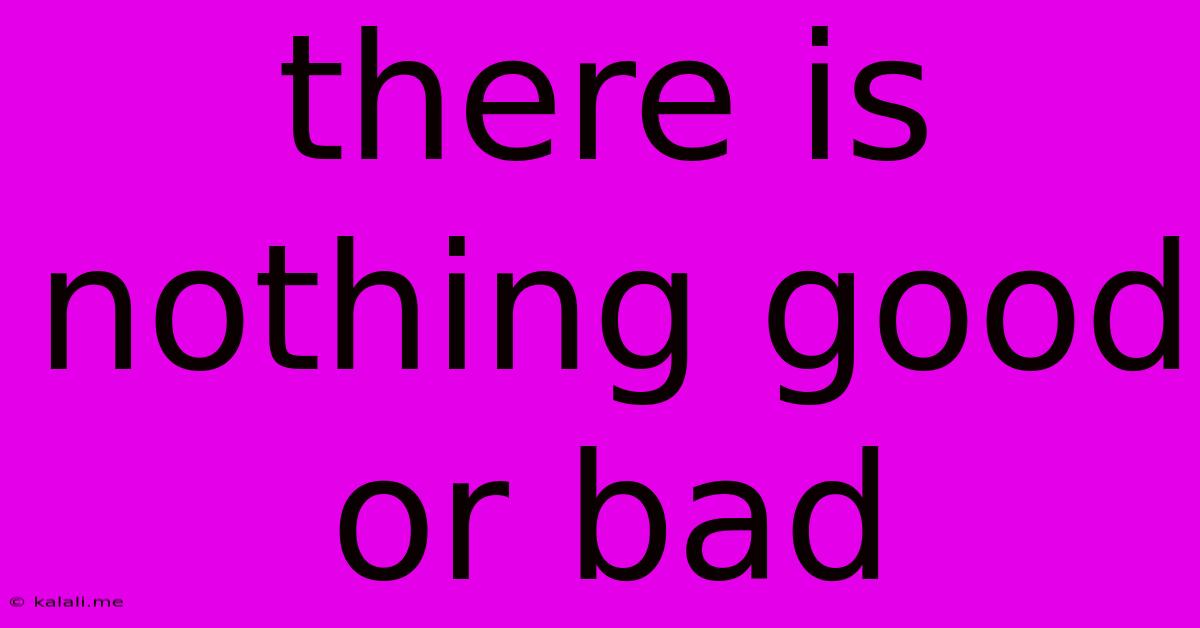There Is Nothing Good Or Bad
Kalali
May 21, 2025 · 3 min read

Table of Contents
There Is Nothing Good or Bad: A Philosophical Exploration of Moral Relativity
Meta Description: Explore the philosophical concept that nothing is inherently good or bad, only perception and interpretation shape our moral judgments. Discover how understanding this idea can lead to greater self-awareness and tolerance.
The famous Shakespearean quote, "There is nothing either good or bad, but thinking makes it so," from Hamlet, encapsulates a profound philosophical concept: moral relativity. This isn't to say that actions have no consequences, but rather that the inherent value we assign to them – good or bad – is subjective, a product of our individual experiences, cultural conditioning, and personal beliefs. Understanding this principle can be transformative, fostering greater empathy, self-awareness, and a more nuanced worldview.
The Subjectivity of Morality
Our moral compass is not an objective, universally agreed-upon instrument. What one culture considers virtuous, another might deem reprehensible. Consider the concept of arranged marriages: In some societies, it's a respected tradition, while in others, it's seen as oppressive. Similarly, dietary restrictions, social customs, and even concepts of justice vary wildly across cultures and throughout history. These differences highlight the crucial role of societal influence in shaping our moral judgments.
This doesn't mean morality is arbitrary; instead, it suggests that our moral frameworks are constructed, not discovered. We learn what is considered "good" or "bad" through upbringing, education, and societal norms. This process is deeply ingrained, often influencing our subconscious decisions and reactions.
The Power of Perspective
Consider a seemingly straightforward example: a heavy rainstorm. While some may lament the inconvenience, farmers might rejoice at the life-giving water for their crops. This simple illustration demonstrates how the same event can elicit vastly different emotional responses and moral judgments depending on the observer's perspective and personal circumstances. What constitutes "good" or "bad" weather is entirely dependent on the individual's needs and situation.
This extends to more complex scenarios. An act of seemingly selfless charity might be motivated by a desire for recognition, while an act of aggression might stem from fear or desperation. Judging the morality of actions without understanding the context and motivations behind them risks oversimplification and potentially unfair condemnation.
Embracing Moral Nuance
Accepting the idea that "nothing is good or bad, but thinking makes it so" does not equate to moral nihilism or the abandonment of ethical principles. Instead, it encourages a deeper, more nuanced understanding of morality. It pushes us to question our own biases, to empathize with differing perspectives, and to engage in critical self-reflection.
By recognizing the subjective nature of moral judgments, we can cultivate:
- Greater Tolerance: Understanding that others' moral frameworks might differ significantly from our own can promote tolerance and acceptance.
- Improved Communication: Acknowledging the subjectivity of morality encourages clearer communication and reduces the likelihood of misunderstandings based on differing value systems.
- Enhanced Self-Awareness: Reflecting on the origins of our own moral compass helps us to identify our biases and to make more conscious and informed ethical choices.
Conclusion: Beyond Good and Bad
The notion that nothing is inherently good or bad is not a call to moral apathy. Rather, it's an invitation to explore the complexities of human morality, to cultivate empathy and understanding, and to engage with the world in a more nuanced and compassionate way. By recognizing the subjective nature of our judgments, we can move beyond simplistic notions of "good" and "bad" and strive towards a more sophisticated and ethically informed life. This journey of self-discovery and understanding is essential for navigating the multifaceted challenges of human interaction and building a more just and equitable world.
Latest Posts
Latest Posts
-
How To Remove Cement From Bricks
May 22, 2025
-
How To Say Very Nice In Italian
May 22, 2025
-
What Self Defense Items Are Legal In Uk
May 22, 2025
-
Can I Use Grout As Tile Adhesive
May 22, 2025
-
Black Spots On Clothes After Washing
May 22, 2025
Related Post
Thank you for visiting our website which covers about There Is Nothing Good Or Bad . We hope the information provided has been useful to you. Feel free to contact us if you have any questions or need further assistance. See you next time and don't miss to bookmark.